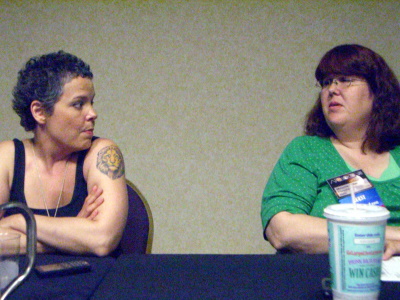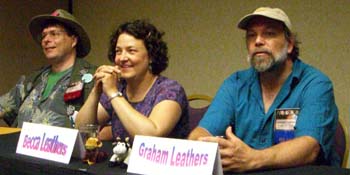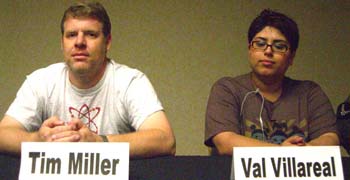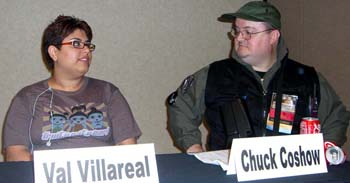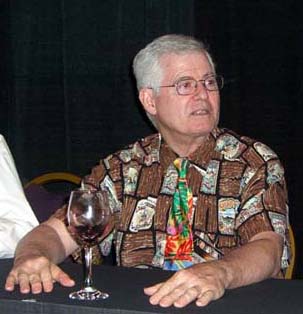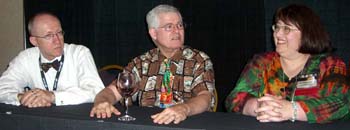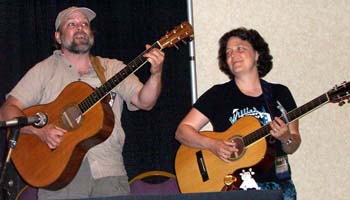Panelists: Rosemary Clement-Moore, Melanie Miller Fletcher, Alexis Glynn Latner (moderator), Julia Mandala, Barbara Winter
Description in the program book: Panelists discuss the process of self-editing. And no, we don't mean just chucking it out the window and starting over. How can you honestly and dispassionately proof and edit your writing.
Start with the ending and write toward the beginning
... is a good advice if you are getting bogged down in the middle of your story and don't know how to progress your plot, or if you are not sure what's supposed to happen at a certain place in the book.
In one of the books she was writing, Rosemary Clement-Moore had beautiful first six chapters, but no ending. She had characters riding in cars. After she wrote the end of the book, she knew what they were going to talk about when they rode in cars.
Alexis Glynn Latner advises: outline ahead. Tolkien plotted LOTR all the way through and then wrote it backwards from the ending.
One panelist observes that a lot of people don't outline because they say they are "organic" writers who work better without an outline. Oh, come on! she says. You don't outline because you can't!
Editing out self-indulgent parts
The panelists addressed a problem that a lot of writers, especially beginners, apparently have: becoming so enamored with some of your characters that you want your readers to know everything about them, including the complete life history of those characters. But the reader usually doesn't need to know all about a certain character. The reader only needs to know enough to understand what's going on in the story right now. To make it easier to part with those extraneous bits, Julia Mandala suggests to think about it this way.
Julia Mandala. I like the editing part because I do that for the reader. I had my fun writing the first draft [where I got to play with the characters as much as I liked]. But [when you are editing, you need to] wonder, what will make the reader enjoy the story the most?
Alexis Glynn Latner agrees: the first draft is totally self indulgent. She also offers this bit of advice on how to assuage the pain of throwing out the passages that are dear to your heart but not necessary to the story.
Alexis Glynn Latner. When you write exciting, but unnecessary scenes about a secondary character who would like to have a book for himself or herself, you don't want to just dump them -- that's bad for you psychologically. Make a file of them so that you could reuse them for another book.If your problem is like mine -- not that I get too attached to my characters (if anything, by the time I finish a story, I can't stand them anymore :-)), but that there's a lot going on in the story and you are uncertain in which order the events should be told, Barbara Winter offered a good piece of advice. Not that I asked her, but I was happy to hear something relevant to my own editing struggles.
Barbara Winter (left) and Melanie Miller Fletcher at ApolloCon 2007Barbara Winter. One of the best tools anyone ever gave me was this. For every scene in your book, write on one page a sentence what the scene is about (e.g. Joe says "bla"), and on the other page, what's the purpose of this scene. If you do that for each scene, you will be able to say: oh, this scene obviously has to come before that one. Or: the purpose of these two scenes is exactly the same. In this case, do I need both of them, or can one of them be cut and go in that other file?
In any case cutting is probably necessary for any story. Apropos of which, Alexis Glynn Latner offered this poetic observation: a story that's alive would heal when you cut it.
No panel on editing is complete without funny tales from editors' trenches. The following story was probably supposed to illustrate mistakes novice writers make with insufficient / inadequate characterization of their characters.
One of the panelists was teaching at a writers' workshop, and one girl turned in a story that had a homosexual pedophiliac bondage relationship in it. The panelists told the girl: I can handle homosexuality and bondage, but an 8-year-old doing those things? That's a big no-no. The girl became really flustered: OMG, the protagonist was NOT a young boy, he was just a very slender, slim-built adult! The panelist did a hillarious impression of the girl becoming a blabbering mess as she tripped all over herself to explain there was no pedophilia in the story. She just wasn't skilled enough to describe her protagonist in a way that would let the reader see him accurately.
Choosing the correct tense and point of view
There was also a lot of talk about writing techniques such as choosing the correct tense and point of view for the story. The panelists were unanimously conservative on these two points. The past tense is almost always the right tense for a story, unless there is a compelling reason to choose present tense. A limited third person point of view is usually the right point of view, or the least problematic anyway.
Most readers, as well as most writers and editors, don't like stories told in present tense. The panelists said the present tense is very hard to do right. Rosemary Clement-Moore said even though present tense is supposed to immerse you in the story and make you feel as if you are experiencing it directly, for some reason it makes you more distant from the story.
The same with first person point of view, said Julia Mandala. It is good only when it's done right. You want to put the reader inside the character, to fully immerse the reader in the character's experiences. E.g. instead of "I was tired", you need to say, for example, "oh, my limbs were like noodles". ("Yes, I know it's a cliche," Julia added, "but you get the point".)
There had been stories done with multiple first-person points of view, but there had to be a very good reason for that. For example, if the hero and the villain are on separate parts of the country, and won't get together for many chapters, and don't know about each other, it is OK to use both first person viewpoints.
Alexis Glynn Latner offered an interesting observation regarding male versus female viewpoint. She likes to write from a male point of view, because, to quote her, "it snaps down productive filters: a guy wouldn't say that, a guy wouldn't notice that". She can become more easily bogged down in a female point of view -- perhaps because women notice more minute details.
How do you know when you're done editing?
A fitting question to end a panel with is how do you tell when you've done all the editing you could do? How do you know when the story is ready to be shown to the first reader (usually a friend or a fellow writer in a critique group)? The panelists say that point comes when you find yourself making minor word changes here and there rather than doing actual editing.
Melanie Miller Fletcher visualizes her stories as a board with nails in it that have loose colorful threads drawn between the nails. She says that she knows the story has been finished and is ready to be shown to the first reader when the strings are all tight.
